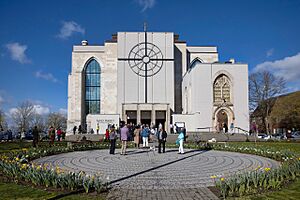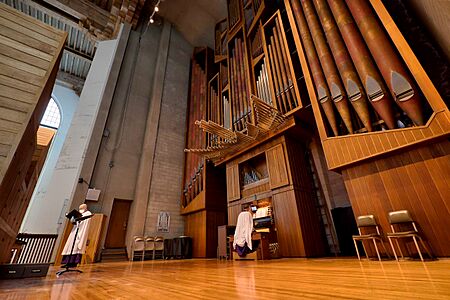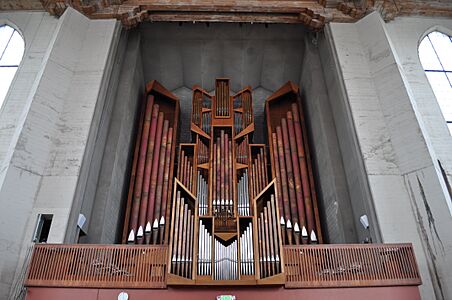St. Mark's Episcopal Cathedral, Seattle facts for kids
Quick facts for kids St. Mark's Episcopal Cathedral |
|
|---|---|
 |
|
| 47°37′55″N 122°19′17″W / 47.63194°N 122.32139°W | |
| Location | Capitol Hill, Seattle, Washington |
| Country | United States |
| Denomination | Episcopal Church in the United States of America |
| History | |
| Status | Cathedral |
| Founded | 1889 |
| Dedicated | 25 April 1931 |
| Architecture | |
| Designated | 1926 |
| Architect(s) | John Bakewell Jr., Arthur Brown Jr., and Édouard Frère Champney |
| Groundbreaking | 1928 |
| Completed | Never completed |
| Closed | 1941–1943 (reopened as a cathedral in 1944) |
| Administration | |
| Diocese | Olympia |
St. Mark's Episcopal Cathedral is a large church in Seattle, Washington. It is the main church for the bishop of the Episcopal Diocese of Olympia. A cathedral is the head church of a region, called a diocese. The church is named after St. Mark. It started as a smaller mission church of another parish in Seattle.
Contents
The Story of St. Mark's
The cathedral has a very interesting history, with many challenges along the way.
An Unfinished Building
In 1926, plans were made to build a grand new cathedral on Capitol Hill. The church community spent two years raising money, and construction finally started in 1928.
However, the Great Depression, a time of serious money problems across the country, began shortly after. This made it very hard for the church to pay for the construction. When the cathedral was dedicated in 1931, it was still not finished.
The church struggled to pay its mortgage (the loan used to build the church). In 1941, the bank took ownership of the building, and it was closed for two years.
A Surprising New Use
From 1943 to 1944, the building was used for something very different. The United States Army used the large, empty cathedral as a place to train soldiers to use anti-aircraft guns during World War II. You can still see murals in the lower level, called the crypt, that were painted during that time.
A New Beginning
In 1944, Bishop S. Arthur Huston began talking with the bank again. Over the next three years, the community worked hard to raise money. In 1947, they finally paid off the entire mortgage.
To celebrate, the church held a special ceremony on Palm Sunday. They burned the mortgage papers in front of the whole congregation to show that the cathedral was finally theirs.
Leadership at the Cathedral
Like any large organization, the cathedral has had changes in leadership. In 2008, the dean (the head priest of a cathedral), Robert V. Taylor, left his position. He and the church's board had different ideas about the future of St. Mark's.
In 2012, Steven Lynn Thomason became the new dean. He works with a team of other priests and deacons to lead the church community.
Location and Scenery
St. Mark's Cathedral sits on a special spot. It is at the top of a very steep hill that drops down to a boulevard below. The wooded area on the hillside is called the St. Mark's Greenbelt and provides a beautiful, natural setting for the church.
The Famous Flentrop Organ
Inside St. Mark's is one of the largest and most famous pipe organs in Seattle. It is located in the choir loft at the back of the church.
The organ was built in 1965 by a Dutch company called D. A. Flentrop. It was carefully restored in the 1990s and 2000s by a local company, Paul Fritts & Company Organ Builders. The organ has 3,944 pipes and is played using four keyboards for the hands and a pedalboard for the feet.
See also



